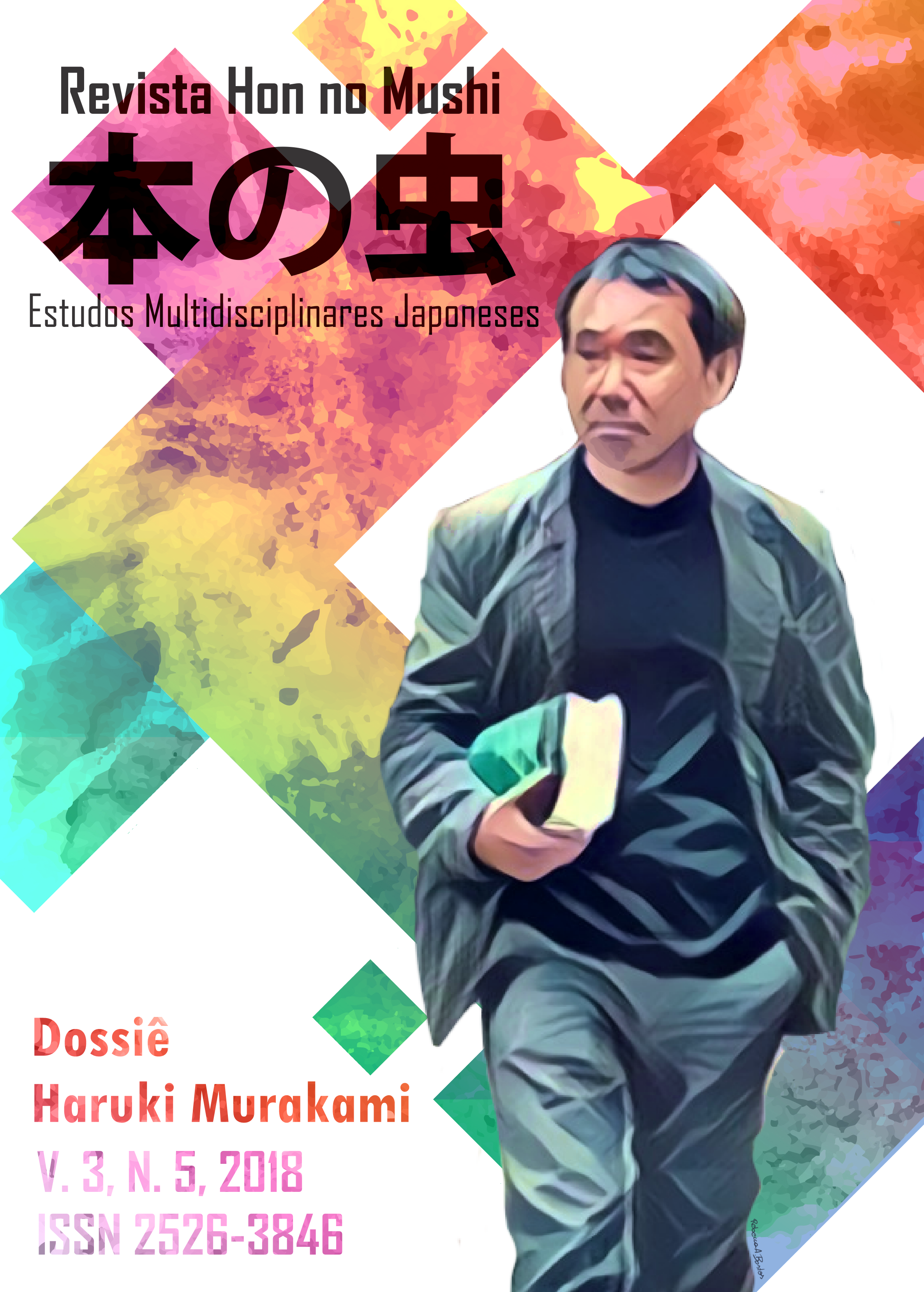THE LITERATURE OF HARUKI MURAKAMI: COURSE AND REVELATIONS
Keywords:
Haruki Murakami; Writing; Literary Movements; Dialogues.Abstract
The present investigation seeks to undertake a reflection and discuss the coming and going in the world-discourses in relation to Haruki Murakami, to the writing and to the diverse and varied dialogues peculiar to literary studies, that spread by the Murakamian territories. The discussion will go through several prose works of the Japanese writer. In Listen to the song of the wind and Pinball, 1973, for example, the writer already delineated his first literary movements highlighting the sadness like simulacrum of the narrative. Therefore, the creative universe of Haruki Murakami will be contextualized from the perspective of the specificities of the discourses of his works, seeking to identify traits related to the writing and the multiple dialogues of time and space that are established in the field of creation and intertextuality, in order to through the in-depth study and unveiling of literary writing, to perceive the discourses and founding ways of Murakami's literary territory and its connection with the Japanese universe and/or outside it.
Downloads
References
BLANCHOT, Maurice. O espaço literário. Trad. Álvaro Cabral. Rio de Janeiro: Rocco, 1987.
ELIADE, Mircea. Mito e realidade. São Paulo: Perspectiva, 2007.
GONZALO, Antonio Joaquín González. Haruki Murakami. Realismo pós-moderno y valores clássicos. In. LUCAS, Fernando Cid (Coord.). La narrative japonesa: del Genji Monogatari al manga. Madrid: Cátedra, 2014, p. 277 -306.
HALL, Stuart. A identidade cultural na pós-modernidade. Rio de Janeiro: DP&A, 2006.
KURIHARA, Akiko; NISHIZAWA, Hiroko. Breve história do Japão. São Paulo: Empresa Jornalística Internacional Press Brasil, 2009.
LINS, Osman. Lima Barreto e o espaço romanesco. São Paulo: Ática, 1976 (Ensaios, 20).
LUCAS, Fernando Cid (Coord.). La narrative japonesa: del Genji Monogatari al manga. Madrid: Cátedra, 2014.
MURAKAMI, Haruki. Andāguraundo. Tóquio: Kōdansha, 1997.
MURAKAMI, Haruki. Após o anoitecer. Trad. Lica Hashimoto. Rio de Janeiro: Objetiva, 2009.
MURAKAMI, Haruki. Blind Willow, Sleeping Woman. Trad. Philip Gabriel and Jay Rubin. London: Vintage, 2007.
MURAKAMI, Haruki. Caçando carneiros. Trad. Leiko Gotoda. São Paulo: Estação Liberdade, 2001.
MURAKAMI, Haruki. Crônica do pássaro de corda. Trad. Eunice Suenaga. Rio de Janeiro: Alfaguara, 2017.
MURAKAMI, Haruki. Dance, dance, dance. Trad. Lica Hashimoto e Neide Nagae. São Paulo: Alfaguara, 2015.
MURAKAMI, Haruki. 1Q84. Trad. Lica Hashimoto. Rio de Janeiro: Objetiva, 2012 – tomo I.
MURAKAMI, Haruki. 1Q84. Trad. Lica Hashimoto. Rio de Janeiro: Objetiva, 2013 – tomo II.
MURAKAMI, Haruki. 1Q84. Trad. Lica Hashimoto. Rio de Janeiro: Objetiva, 2013 – tomo III.
MURAKAMI, Haruki. Do que eu falo quando eu falo de corrida. Trad. Cássio de Arantes Leite. Rio de Janeiro: Alfaguara, 2010.
MURAKAMI, Haruki. Kafka à beira-mar. Trad. Leiko Gotoda. Rio de Janeiro: Objetiva, 2008.
MURAKAMI, Haruki. Kami no kodomotachi wa mina odoru. Japão: Shinchosha, 2000.
MURAKAMI, Haruki. Kokkyo no minami, taiyo no nishi. Japão: Kodansha, 1995.
MURAKAMI, Haruki. Minha querida Sputnik. Trad. Ana Luiza Dantas Borges. São Paulo: Alfaguara, 2008.
MURAKAMI, Haruki. Norwegian Wood. Trad. Jefferson José Teixeira. São Paulo: Alfaguara, 2008.
MURAKAMI, Haruki. O assassinato do comendador. Trad. Rita Kohl. Vol. 1. Rio de Janeiro: Alfaguara, 2018.
MURAKAMI, Haruki. O elefante desaparece. Trad. Lica Hashimoto. Rio de Janeiro: Alfaguara, 2018.
MURAKAMI, Haruki. O Impiedoso País das Maravilhas e o Fim do Mundo. Trad. Maria João. 5ª ed. Alfragide: Casa das letras, 2018.
MURAKAMI, Haruki. O incolor Tsukuru Tazaki. Trad. Eunice Suenaga. São Paulo: Alfaguara, 2014.
MURAKAMI, Haruki. Ouça a canção do vento/Pinball, 1973. Trad. Rita Kohl. Rio de Janeiro: Alfaguara, 2016.
MURAKAMI, Haruki. Romancista como vocação. Trad. Eunice Suenaga. São Paulo: Alfaguara, 2017.
MURAKAMI, Haruki. Sono. Trad. Lica Hashimoto. Rio de Janeiro: Objetiva, 2015.
MURAKAMI, Haruki. Underground: the Tokyo gas attack and the Japanese Psyche. New York: Vintage International, 2000.
MATSUMOTO, Kenichi. Murakami Haruki: Toshi-shosetsu kara sekai bungaku ê. Japão: Daisan-bunmei-sha, 2010.
NAOKA, Mori. Murakami Haruki y España. In. Revista Kokoro: Revista para la difusión de la cultura japonesa, Espanha, N. 16, Septiembre-Diciembre 2014, pp. 2-12.
NOHIRO, Kato. Murakami Haruki wa, muzukashii. Japan: Iwanami, 2015.
OKAKURA, Kakuzo. O livro do chá. Trad. Cláudio Giordano. São Paulo: Pensamento, 2009.
ORWEll, George. Escritores e Leviatã. In. PIZA, Daniel (Org). Dentro da Baleia e outros ensaios. Trad. José Antonio Arantes. São Paulo: Companhia das Letras, 2005.
RUBIN, Jay. Haruki Murakami and the Music of Words. London: The Harvill Press, 2002.
SEATS, Michael. Murakami Haruki: the simulacrum in contemporary Japanese culture. USA: Lexington Books, 2009.
WELCH, Patricia. Haruki Murakami’s Storytelling World. In. World Literature Today, Vol.79, n.1, janeiro/abril, 2005.
Downloads
Published
Issue
Section
License
The copyright belongs to the Hon Journal in Mishi - Multidisciplinary Japanese Studies and to the authors of each article. All work or part of it, when quoted or used, must be referenced.




